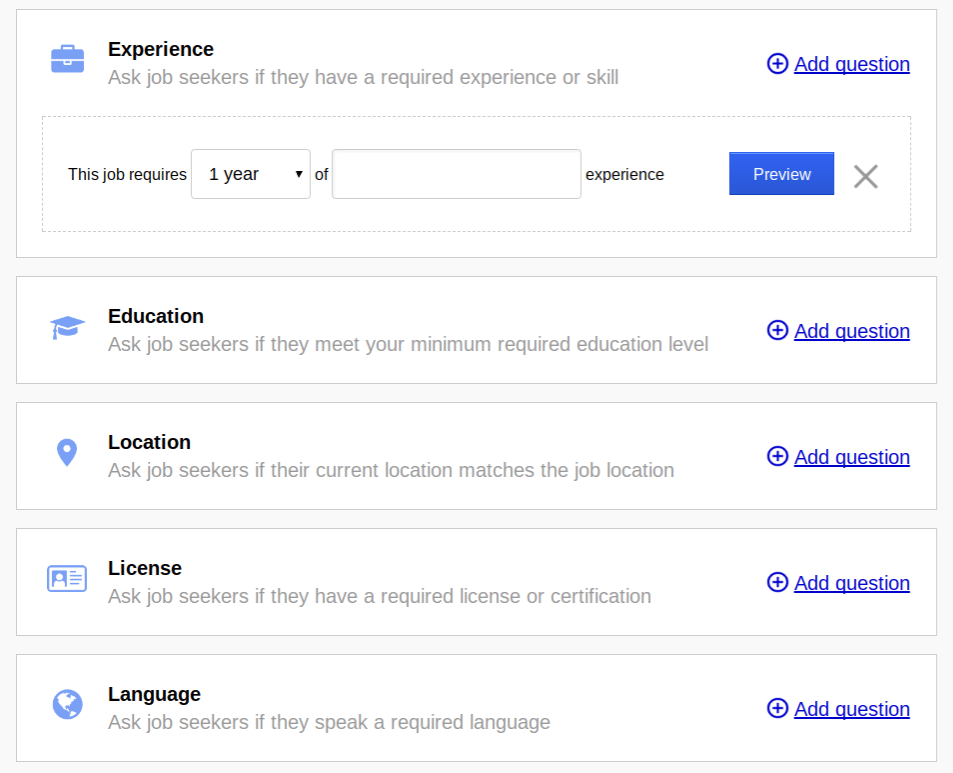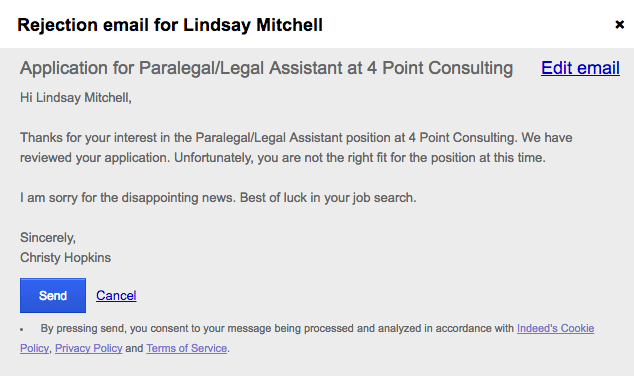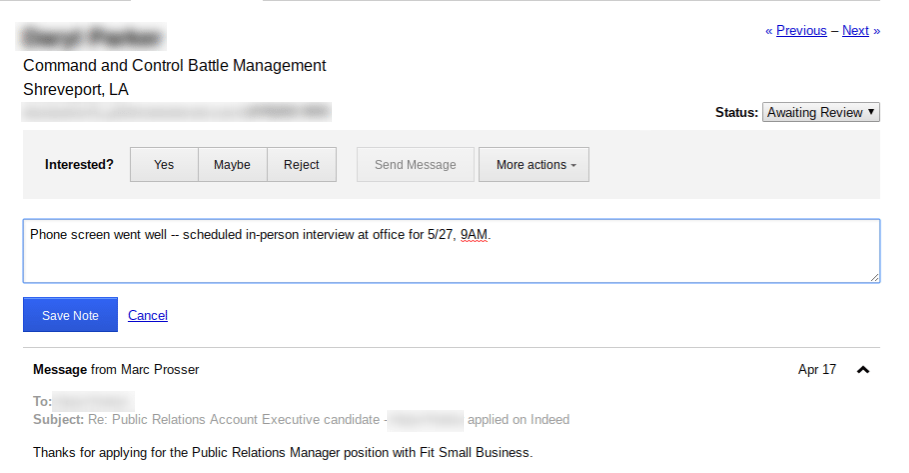There are many apparently conversational topics that can be interpreted as illegal when asked during an interview. Something as simple as,”Oh, I grew up there too!” Can be interpreted as a potential prejudice and so would fall under an illegal interview question.
The best way to steer clear of illegal interview questions is to know what might get you into trouble. Then, execute a structured hiring process employing a system like Indeed to maintain your candidate interactions formal and on-point.
Visit Really
Please be aware that this report contains general information, and we suggest consulting your own legal professional for specific advice pertaining to your interview process.
Most Commonly Asked Illegal Interview Questions
We moved to the experts in the area and asked the most popular illegal interview questions are that they view. David Miklas, P.A.,is a labour & employment lawyer with 18 years of expertise working with employers of 5-5000 employees. Here is the most common illegal interview questions he sees:
Top 8 Illegal Interview Questions
- Are you married?
- Have you ever been divorced?
- Are you currently pregnant?
- How many children do you have?
- You’re not a Muslim, are you?
- What church do you go to?
- Who is your Pastor?
- You’re not gay, are you?
A number of them seem very obvious in their own offenses, but others just like asking somebody how many kids they have, are more subtle. Some of the other sources pointed out apparently innocent questions which violate labour laws involving these two shared with Taylor Dumouchel of Peak Revenue Meeting:
- We see you graduated from high school in 1971, would you plan on retiring soon?
You cannot ask someone how old they are, AND you can’t discriminate against somebody who seems too old or too young. It does not apply to how well someone can perform the job. You may ask, but what their 5-year career program is. - In case you are a mom, will you’ve got to leave early each day or prevent travel?
You cannot request this question and cannot discriminate against a woman because she’s children. You can’t inquire about childcare. You can, however, ask if working late or travel will be fine with all the candidate.
Here is another common illegal interview questions asked, especially in retail settings. (Contributed by Matt Franks, the Managing Director at Dreambooth.)
- Is English your first language?
Many retail businesses that are hiring people for consumer-facing roles often make the mistake of asking this question to interviewees from different countries. The fact is, however, it is not actually an employer’s lawful right to know if a language is a person’s first language or not.
Out of our HR specialist: Please note that many companies do ask the above question. Rather, they should ask,”Are you native-level fluent in English?” Or have a candidate rank themselves out of 1-5 with 5 being fluent in English.
10 More Illegal Interview Questions to Prevent
From myself, as a HR specialist and recruiter, here are 10 more queries to avoid (and what to ask rather when appropriate):
- What structures are you can make for childcare while you work?
- How old are your children?
- What does your wife/husband/partner do for a living?
- Where did you live while you’re growing up?
- Are you comfortable working for a female/male boss?
- There’s a massive disparity between your age and that of the place’s coworkers. Is this a problem for you?
- Have you ever been arrested? (Ask instead, “Have you ever been convicted of a crime?”)
- Have you got a car? (Ask instead,”How long is the commute to our workplace?”)
- How long do you intend to work until you retire?
- Perhaps you have ever experienced any serious illnesses in the last year?
However, what about in the event that you have a candidate that volunteers information about the above mentioned questions, even if you didn’t ask them? That happens all of the time.
What About When A Candidate Tells Me Something Inappropriate?
People overshare nowadays — on social media, in line in the supermarket, and during interviews too– particularly when a candidate is nervous and has a rush of adrenaline.
If a candidate unintentionally says something like,”Well, I beat breast cancer annually” or”I’m having some credit issues paying off my debt, which Is the Reason Why I need a new job”, then you just need to follow 3 steps:
- Pause in your response to them.
- Make strong eye contact so as to make certain your purpose will get across.
- Say something such as, “Let’s stick to the listing of queries I have here, we’re short on time” and move right onto another question.
If the candidate goes there again, you can be more firm and say,”we unfortunately are going into personal details. I’ll ask you to stick to answering the questions at hand, please”. If the candidate continues down oversharing lane, I would counsel you to potentially even finish the interview short as politely as possible. This indicates that they aren’t listeningor that they are searching for you to start a illegal can of worms. At worst, they could be a lawsuit seeker.
6 Steps To Prevent Illegal Interview Questions
The best approach to avoid asking prohibited interview questions or just bad ones, is to be ready. Knowing how to interact with candidates at each step of the procedure will keep will maintain the spontaneous chit-chat to a minimum– when a slip-up is most likely to occur.
The best prepared employers will use a method to structure their connections. If you’re hiring through Indeed, our recommended job board, they provide all the resources you’ll need to attain this: First, utilize Indeed to write a easy and expert job description that minimizes potential risks from the start. Once software come in, you can use Indeed’s email templates to quickly send pre-written acceptance or rejection messages — again, assisting you to save time, and maintain your conversation professional and predictable.
If it is time to run the real interview, we highly suggest following a structured interview procedure in which you prepare a list of questions, and ask those some queries to each candidate. You can then use an interview test scorecard to monitor responses. This not only keeps your interviews on-point, but it makes it easier to compare candidates and finally make a hiring decision.
Let’s look at these steps in more detail:
1. Write a Rock-Solid Job Description
Your project description is frequently the first thing a candidate reads about your business — and consequently, in a sense, is your initial”interaction” together. Just as you would greet a new visitor to your business with respect and professionalism, your job ad should do the same. If there’s any perceived prejudice on your job description, then it can easily spill over to the rest of the hiring procedure.
For instance, “searching for spry, excited rockstars willing to give it their ” could present a potential age bias. Instead, you should concentrate on the requirements and requirements of this project: “Candidate has to be OK with extended hours and yearly business trips for 3-5 days.”
2. Contain a Questionnaire
Similarly, a questionnaire in your application enables you to ask candidates important questions straight away, including, if they hold a certification, or fulfill a language or instructional requirement.
Indeed comprises an optional questionnaire-builder when you post a job advertisement. This makes it effortless to ask these questions in a simple and professional way. You are able to find these key interview questions from the way early, and also in ways you know will probably be compliant.

Indeed makes it effortless to add required questions to your job program.
A survey additionally ensures applicants are conscious of your requirements right away, which no under-qualified candidate”sneaks” on the shortlist.
3. Use Email Programs
When you receive a great deal of candidates, it can be overwhelming to respond to each and every one. Instead, you can use email templates to immediately follow along with every candidate.
1 template should invite them to another step in the procedure (typically, a brief phone interview). Another should thank them for applying, but notify the candidate that they will not be considered. A third email template, delivered to a’maybes,’ should let them know you’re going to be responding with a decision shortly.

Indeed provides classy email templates, which you may send with a single click from a candidate’s application.
Again, email templates take the spontaneity out of your discussion. Especially if you have multiple team members reviewing applications, it’s always better to error on the side of security, and maintain your interactions predictable.
4. Phone Screen Candidates
Prior to conducting your main job interviews, it’s important to schedule short phone interviews with your best candidates. These may be anywhere from 5 to 30 minutes, and your goal is just to determine whether or not you want to move to a longer in-person interview.
Phone screens save you time, as you can rule-out any disappointing candidates right away. This may make your in-person interviews easy, as you are not as likely to be in almost any awkward or unpredictable situations.
As with any other measure in the hiring procedure, telephone screens are a time when illegal interview questions can inadvertently slide. To avoid this, keep the conversation focused on the candidate’s resume, for example their job history and qualifications. Bear in mind that even seemingly relevant questions, like,”when did you graduate from school?” Can be unlawful because of their implication (age-bias). Be sure to take a look at our top 51 phone screen questions that will assist you come up with ideas.
5. Conduct a Structured Interview
When it is time for your primary, in-house job interviews, you are able to error on the side of caution by conducting structured interviews. A structured interview is when you ask the same questions to each candidate. As long as you are careful in picking your queries, this procedure is almost air-tight for mitigating liability.
Ideally, you need to ask the same questions in the same purchase. Since the conversation may fluctuate based upon a candidate’s response, you’ll also want a list of follow-up questions prepared, which you may roughly emulate for every candidate. Because of this, you’ll be able to more easily compare and rank applicants, based on their responses to the queries.
Check out our entire guide on conducting a structured interview, including a free template with questions or use one of 11 interview test forms.
6. Keep Notes Using Really
Last but not least, make sure you’re taking comprehensive notes throughout the interview, and throughout the rest of the hiring process. Have your list of questions handy, and write (or type) the candidate’s responses to each question.

Indeed allows you to save notes directly on an individual’s program.
The main reason is to help your memory when it is time to compare candidates and create a hiring decision. Using Indeed, you can save notes right on the candidate’s application, and that means you have all of the significant information organized in one area. This is particularly useful when you have multiple hiring supervisors reviewing candidates.
The other key reason to store notes is that you’ll have a clear justification for the hiring decision. In case you’re charged with making a biased choice, or asking an illegal interview question, your notes will function as your best defense.
The Bottom Line
Illegal interview questions may make for humorous stories, until you are on the other side as a business owner and facing a lawsuit. It’s very simple to become distracted during a meeting and that’s the reason why we recommend preparing as much as possible.
Implementing a structured hiring process employing a system like Really will keep your discussions on-point from the very start. Not to mention, it will be able to help you make better hiring decisions, because you can more readily rank candidates based on their responses to the interview questions.
Visit Indeed

